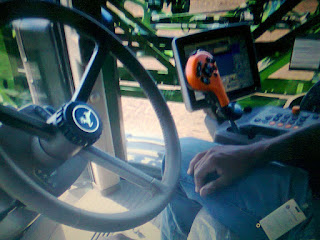Agribusiness, Agriculture, Veterinary Medicine, Cassava, Garri, food security, Agritech and the Red Meat Value Chain.
Showing posts with label big data. Show all posts
Showing posts with label big data. Show all posts
Friday, July 22, 2016
'Anti-evolution' drugs could be the key to finally curing cancer.
Cancer researchers are coming together to create a new generation of so-called ‘anti-evolution’ therapies, which they say will combat the disease’s “lethal ability to adapt and evade treatment”.
Experts from The Institute of Cancer Research in London teamed up with The Royal Marsden NHS Foundation Trust and have launched a roadmap for overcoming what they call ‘the cancer evolution’.The plan sets out how big data analysis can identify cancer’s capacity to sidestep treatment by evolving drug resistance, and uncover game-changing new treatments.
Cancers evolve and adapt much as animals and plants do in response to changes in the environment, or bacteria do when they become resistant to antibiotics. Patients may initially respond to cancer treatment, but they often then relapse as their disease evolves and becomes resistant.
The scientists will therefore use big data to predict how cancers will evolve and their escape routes from treatment, which they say will allow them to design state-of-the-art clinical trials, assessing the best ways of combining new anti-evolution therapies. See
Wednesday, July 6, 2016
Precision agriculture and unmanned tractors.
Cory Anstey always wanted to be a farmer. It was the joy of riding in the tractor, "the smell of the dirt in the spring" that drew him to the fields. Anstey, 44, is also a bit of a techie. Luckily for him, modern agriculture lets him embrace both of his passions. Anstey started using GPS technology in his machinery about 15 years ago and now even lets his tractor steer itself across his fields.
"It's very addictive, once you've had it," he tells me while taking a break at the 21st Century Cooperative, a mechanic shop/gas station/grain elevator in Cumberland, Iowa. Known simply as "the Co-op," the dusty office with grimy floors is the most popular hangout in this town of 250 people. It's here where farmers, many clad in overalls and boots, gather to drink pop (soda, for those not in the Midwest), snack on popcorn and gossip -- which includes chatter about the latest machines.
As farmers work more acres with the same -- or even less -- manpower and bigger, more unwieldy machines, they're increasingly turning to technology for help. But it's not the usual tech suspects like Google or Apple inventing a better pitchfork; instead, traditional agriculture machinery manufacturers like John Deere and New Holland keep stepping up their innovation.
Self-driving tractors are commonplace (the farmer still sits behind the wheel). Sensors can detect everything from what the machine's doing to what the crop conditions are. Farmers can monitor the progress of planting and harvesting from their iPads, and tractors serve as their own mobile hotspots. It's a skewed reflection of our own increasingly connected world, except farmers have used many of those technologies, like auto-steering and GPS mapping, since the '90s.
It used to take years for farmers to figure out the condition of their land. Today, a farmer doesn't need much institutional knowledge about the field he's working -- his tractor knows all, thanks to GPS mapping. Location tech manages three quarters of the acres farmed in Iowa, Darr said.
Mapping technology talks to sensors in the machines, letting farmers track what's going on at each location, like yield and moisture level. You can see the info on a display built into the tractor, like a big GPS display. The data gets saved in the cloud and can be accessed on computers and tablets. Many farmers even mount iPads in their tractors as second monitors.
The saying about real estate is location, location, location," said Ron Zink, John Deere's director of onboard applications. "It's the same with precision ag. You need to know exactly where you are."
Planters have auto-shutoff technology that uses GPS to make sure a farmer doesn't accidentally plant an area twice, saving seeds, fuel and time. They can be nearly perfect in spacing seeds apart from each other, compared with only about 60 percent accuracy with planters from 10 years ago, according to Darr.
Farmers can follow their yield in real time as they harvest their fields or go back to the data later. And the machines themselves collect information like the temperature of the engine, the amount of fuel used and the location of that machine, letting farmers repair and maintain equipment.
 contribution by cnet.com
contribution by cnet.com
 contribution by cnet.com
contribution by cnet.com
Monday, October 26, 2015
Subscribe to:
Comments (Atom)
Agribusiness ideas.
Popular Posts
-
Waste-generated biogas is turning homes into power plants.Sandra Sassow wants to talk about sticky subject of waste. Just the word, the um...
-
Five ways agriculture could benefit from artificial intelligence. Agriculture is the industry that accompanied the evolution of humanity ...
-
Locally tailored public health messages dispel Ebola myths in Sierra Leone. A two-way channel of communication, appointing community leade...
-
Step up biosecurity on your pig farms.Report any case of sudden deaths and remember do not touch carcass . Disinfect farms and use foot ba...
-
Are you considering starting your own business in the meat industry? Our new E-book can help you get started! In our guide, you will fi...
-
Young animals require high quality protein ingredients to support feed intake, digestive function and immunity and to enhance stress res...
AGRIBUSINESS EDUCATION.
Translate
I-CONNECT -AGRICULTURE
AGRIBUSINESS TIPS.
AGRIBUSINESS.
The Agriculture Daily
veterinarymedicineechbeebolanle-ojuri.blogspot.com Cassava: benefits of garri as a fermented food. Cassava processing involves fermentation which is a plus for gut health. The fermentation process removes the cyanogenic glucosides present in the fres...






